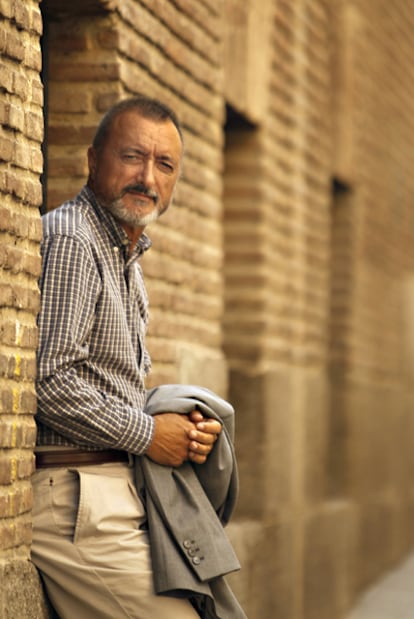Alatriste swashbuckles back
Arturo Pérez-Reverte's glamorous sword-swishing hero is back for his seventh adventure, 'The Bridge of the Assassins,' set in 17th-century Venice
The latest adventure of Arturo Pérez-Reverte's mercenary hero Captain Alatriste will be out in Spanish on October 27, with the English edition to follow in the new year. A former soldier in the Flemish wars, Pérez-Reverte's character scrapes out his living in 1620s Madrid, hiring himself out for four maravedís a day "in employ of little glory," as a swordsman for those with "neither the skill nor the daring to settle their own quarrels."
Alatriste's fans have been waiting since 2006 for the seventh episode in the series, which has been published in more than 50 countries, and sold three million copies in Spanish alone.
El puente de los asesinos (which will be published in English as The Bridge of the Assassins ) sees Alatriste and his faithful companion Iñigo Balboa set off for Venice, where they are soon caught up in a web of intrigue.
Alatriste was created 15 years ago, and was an immediate success for Pérez-Reverte, a former war correspondent who had already established an international reputation with historical novels such as The Flanders' Panel and The Fencing Master .
"I started writing the series for fun more than anything else: a kind of homage to the Golden Age combined with swashbuckling," says Pérez-Reverte. "It was also a way to explain to my daughter's generation an era that had disappeared from Spanish literature, the 16th and 17th centuries, an age that had its positive side, but that proved disastrous in the long term."
As the series has progressed, the books' narrator, Balboa, has grown up, and begins to see a Spain that believes itself to be the center of the world, but which cannot see the catastrophe that awaits shortly down the road.
The books are set amid the slow decline of the Holy Roman Empire, a slice of central Europe ruled over by Philip II until the late 16th century, and where the German state rose up against Catholic rule. At the same time, Europe is increasingly threatened by the Ottoman Empire in Turkey.
"In reality, the books are as much about modern-day Spain: we are who we are as a result of those centuries of hypocrisy, of omnipresent religion, of the power of the Church, of the abuse of power and of pointless wars in which we spent all the gold we had stolen from America," he says.
Pérez-Reverte believes that Spain missed its chance to become a modern state by refusing to accept the Reformation. "The countries that would come to dominate the world created a modern God, a God who practiced commerce, a Lutheran, a God who allowed us to read books and to progress; but we insisted on a God who was obscure, angry, a God that has led us down the road to ruin. Some idiots who read these books think that I am celebrating Imperial Spain. That is a lie."
"I wanted the Alatriste series to paint Spain in several different ways. The King's Gold is about the economy; The Sun Over Breda is about war; Pirates of the Levant is about the Mediterranean; Purity of Blood is about religion and the Inquisition. In this one I wanted to explore Venetian politics, which had a big impact on Spain."
Alatriste is a complex character, says Pérez-Reverte: "He is ambiguous: he has tortured people, he has slashed the face of a woman, he kills for money. These kinds of men are the real heroes. I have met a lot of Alatristes, men who could have been good. It is important for him to have his enemies, his nemesis that he will eventually have to face down at the end of the book. A man is also defined by his enemies. Anybody who really lives life, who takes risks, who gets involved, who fights who loves... makes enemies and leaves a few bodies by the wayside. To live means making choices, and to take sides, and if you take sides, you have to accept the consequences. I have never trusted people who say that they have no enemies: they are either lying or simply stupid."
As a former war reporter - Pérez-Reverte covered the Balkans conflict in the early 1990s - he remains fascinated by the job of the soldier.
"War is like alcohol: it brings out what is already inside you," he says. "War is eternal: it doesn't matter whether you are fighting with a grenade launcher or with a sword - the tension, the fear, the loneliness is the same. My advantage is that having seen something of war, I can give my characters something of the reality of conflict, of what happens to people under that kind of stress. There are novelists who write from the imagination, which is perfectly respectable, and there are others, like myself, who write from experience."

Tu suscripción se está usando en otro dispositivo
¿Quieres añadir otro usuario a tu suscripción?
Si continúas leyendo en este dispositivo, no se podrá leer en el otro.
FlechaTu suscripción se está usando en otro dispositivo y solo puedes acceder a EL PAÍS desde un dispositivo a la vez.
Si quieres compartir tu cuenta, cambia tu suscripción a la modalidad Premium, así podrás añadir otro usuario. Cada uno accederá con su propia cuenta de email, lo que os permitirá personalizar vuestra experiencia en EL PAÍS.
¿Tienes una suscripción de empresa? Accede aquí para contratar más cuentas.
En el caso de no saber quién está usando tu cuenta, te recomendamos cambiar tu contraseña aquí.
Si decides continuar compartiendo tu cuenta, este mensaje se mostrará en tu dispositivo y en el de la otra persona que está usando tu cuenta de forma indefinida, afectando a tu experiencia de lectura. Puedes consultar aquí los términos y condiciones de la suscripción digital.








































